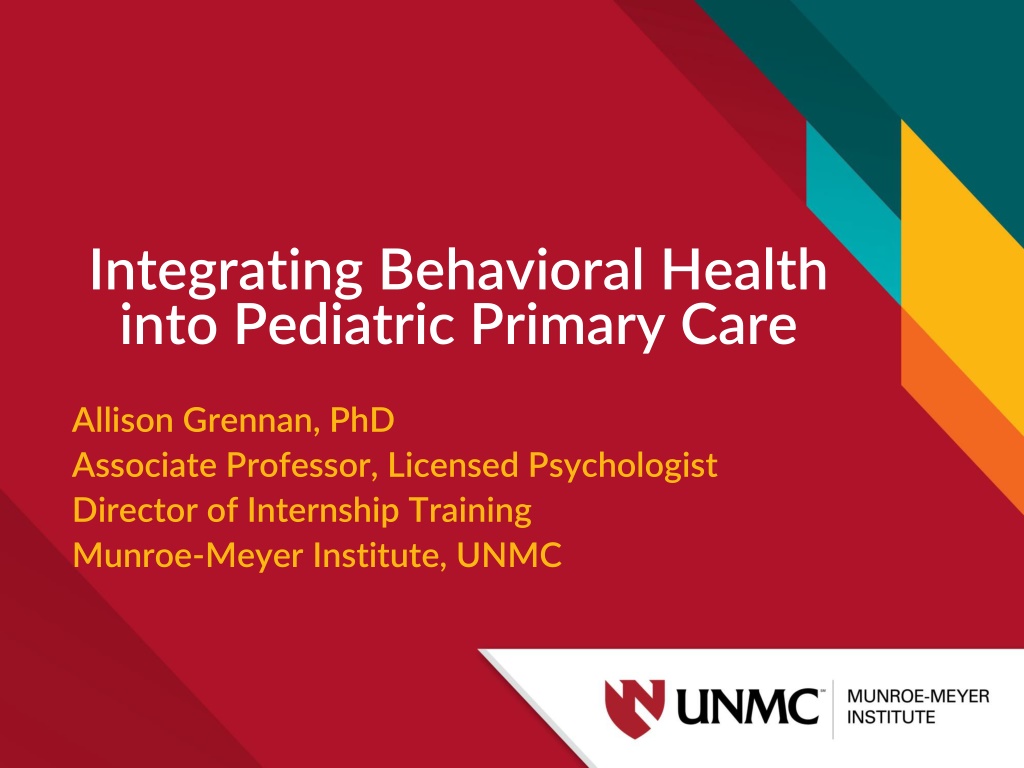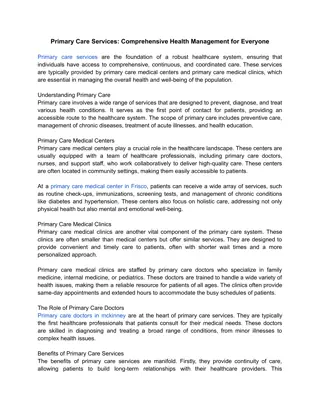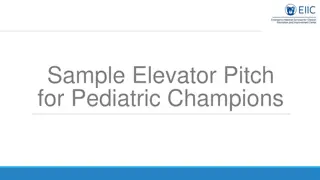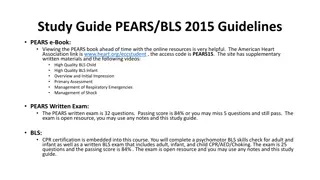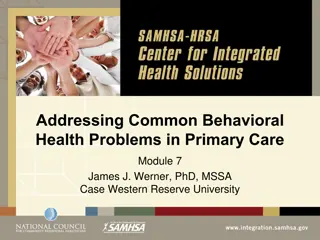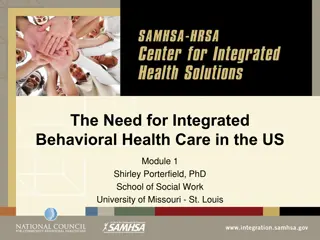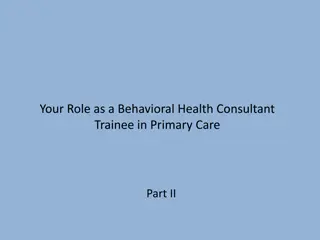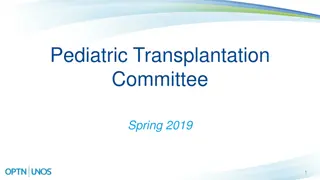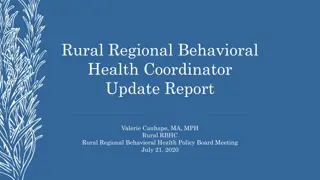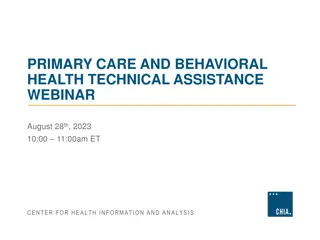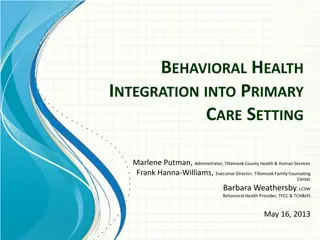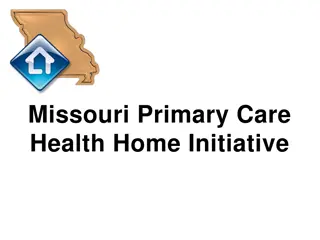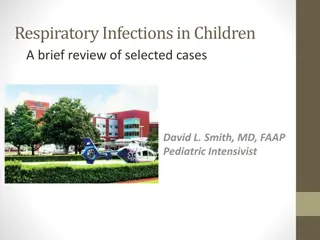Integrating Behavioral Health into Pediatric Primary Care
Integrating Behavioral Health into Pediatric Primary Care is crucial due to the increasing prevalence of mental health conditions among children. This integration aims to bridge the gap between primary care and mental health services, as a significant number of children with mental health concerns are first seen in primary care settings. However, challenges such as access barriers and inadequate coverage hinder the effective delivery of behavioral health services. Addressing these challenges is essential to ensure that children receive the necessary mental health support they need to thrive.
Download Presentation

Please find below an Image/Link to download the presentation.
The content on the website is provided AS IS for your information and personal use only. It may not be sold, licensed, or shared on other websites without obtaining consent from the author. Download presentation by click this link. If you encounter any issues during the download, it is possible that the publisher has removed the file from their server.
E N D
Presentation Transcript
Integrating Behavioral Health into Pediatric Primary Care Allison Grennan, PhD Associate Professor, Licensed Psychologist Director of Internship Training Munroe-Meyer Institute, UNMC
Kids Mental Health 1 in 5 Children with diagnosed Mental Health condition in 2022
Where are most kids? Behavioral health concerns in children highly common and increasing1 Physicians as De Facto Mental Health providers2 75% of children with mental health concerns are seen in primary care3 Sources: 1 SAMSHA, 2013; 2 - Stein et al., 2008; 3 - National Institute of Health Care Management Foundation 2009
Behavioral Health Needs 67% of individuals with a behavioral health disorder do not receive behavioral health treatment1 30-50% of referrals to behavioral health from primary care don t make first appt2,3 Two-thirds of primary care physicians reported not being able to access outpatient behavioral health for their patients4 due to: Shortages of mental healthcare providers Health plan barriers Lack of coverage orinadequate coverage Sources: 1Kessler et al., NEJM. 2005;352:515-23.2Fisher & Ransom, Arch Intern Med. 1997;6:324-333. 3Hoge et al., JAMA. 2006;95:1023-1032.
BH Takes time 25 19.69 20 17 15 Medical Behavioral Medical & Behavioral 10 8.04 5 0 Average Time Spent Valleley, R. J.Polaha, J., Begeny, J., & Evans, J. H. (2006). Running out of time: Physician management of behavioral health concerns in rural pediatric primary care. Pediatrics Electronic Pages, 118, e132-e138.
And Money $20.00 $18.12 $18.00 $16.00 $14.00 $12.00 Medical Behavioral Medical & Behavioral $10.00 $7.35 $8.00 $6.00 $4.34 $4.00 $2.00 $0.00 Avg $ per Minute Meadows, Valleley, Haack, Evans, and Thorson (2011). Physician Costs in Providing Behavioral Health in Primary Care. Clinical Pediatrics, 50, 447-455.
From: Peek CJ and the National Integration Academy Council. Lexicon for Behavioral Health and Primary Care Integration: AHRQ Publication No.13-IP001-EF. Rockville, MD
Models of Integrated Care Primary Care Behavioral Health (PCBH) describes how licensed mental health providers/psychologists and primary care providers work in collaborative environments to address physical and behavioral health Collaborative Care or CoCM is a specific framework of integrated care by the American Psychiatric Association Collaborative Care Model
Adult Behavioral Health in Primary Care Anxiety Pain Depression Substance Abuse 50% - 70% of physical complaints have no identifiable physical cause (O Donohue, 2003)
Children vs Adults in IPC Focus on the developing child Families play an active role in treatment Treatment focuses on coping and adjustment and behavior management NIMH
Pediatric Integrated Care Screening Prevention Early Intervention SAMHSA: https://www.samhsa.gov/capt/practicing-effective-prevention/prevention-behavioral-health/adverse-childhood- experiences
Primary Care Behavioral Health Model (PCBH) Model of care that integrates behavioral health in the primary care setting Goal: Optimize access to behavioral health support across a variety of patient presentations PCP sees patient and provides referral to the BHC Licensed behavioral health professionals are referred to as Behavioral Health Clinician BHC s Behavioral health assessment and treatment delivered in the same space as the PCP s
Child-Adolescent Behavioral Health Concerns Sleep Disorders Learning Disabilities Developmental Delays Depression Anxiety Relationship Problems Non-compliance Excessive Tantrums Elimination Disorders ADHD School Behavior Problems & Refusal
Behavioral Health Needs 75-80% Medical and BH Provider in Primary Care Referrals and Community Care 10-15% 5% Specialty Care
Example Components of Integrated Care Screening by PCP Collaboration and Teamwork Shared practice space Coordinated assessment and treatment plan Communication (formal and informal) Timely access to behavioral health Shared office space System to share records https://www.integration.samhsa.gov/workforce/Integration_Competencies_Fi nal.pdf
Why Integrated Care? https://www.kumc.edu/documents/internalmed/quadruple-aim-healthcare-image.pdf
Six Reasons Why Behavioral Health Should be Part of the Primary Care Medical Home 1. High prevalence of behavioral health problems in primary care (needing long-term follow-up) High burden of behavioral health in primary care High cost of unmet behavioral health needs Lower cost when behavioral health needs are met Better health outcomes Improved satisfaction Improving work life of health care providers 2. 3. 4. 5. 6. 7. Quadruple Aim Behavioral health integration achieves the quadruple aim.
Why Integrated Care? Research is finding Increases access to behavioral health care. Improves health outcomes for patients with mental illness and/or substance use disorders. Improves health behaviors such as compliance with treatment recommendations, exercise, and diet. Reduces overall health care costs, thus representing the opportunity for shared savings for primary care practices. http://www.jabfm.org/content/30/1/25.full?sid=f635119b-7243-4bfe-bbd2-3241c11377f4; https://www.ncbi.nlm.nih.gov/pubmed/28379819; http://medicaleconomics.modernmedicine.com/medical- economics/content/tags/affordable-care-act/integrating-primary-care-and-mental-health-key-im?page=full
Improved Access Attended 1st appointment 100 90 80 70 85% 81% 60 50 40 30 20 10 0 2007 2020 Valleley, R.J., Kosse, S., Schemm, A., Foster, N., Evans, J., & Polaha, J. (2007). Integrated Care for Children in Rural Communities: An Examination of Patient Attendance to Behavioral Health Services. Families, Systems, & Health, 25, 323- 332. Valleley, Meadows, Burt, Menousek, Hembree, Evans, Gathje, Kupzyk, Sevecke, Lancaster (2020). Demonstrating the impact of collocated behavioral health in pediatric primary care. Clinical Practice in Pediatric Psychology, 8(1), 13-24.
Provider Satisfaction Physicians who have adopted an integrated model of care report strong agreement that this type of model helps to improve factors such as: Quality and continuity of care for their patients time that it allows them to spend on medical issues Cost Follow-up Confidence with identification/management of problems Reduced stigma for their patients Hine, Grennan, Menousek, Robertson, Valleley, & Evans. (2016). Physician Satisfaction with Integrated Behavioral Health in Pediatric Primary Care: Consistency Across Rural and Urban Settings. Journal of Primary Care and Community Health. 1-5.
Exciting Directions Training and Supervision in IPC Early evaluation and identification for Autism Spectrum Disorders Trauma-Informed Care
Mid-America Mental Health Technology and Transfer Center Funded by the Substance Abuse and Mental Health Services Administration 5-year grant awarded to Dr. Joseph Evans at the University of Nebraska Medical Center Aligns mental health systems and professional competencies with evidence-based practices Primary target states: Missouri, Iowa, Nebraska, and Kansas - but available to any provider(s). Provides free/low cost training and technical assistance on topics leading to effective behavioral health practice https://mhttcnetwork.org/centers/content/mid-america- mhttc
